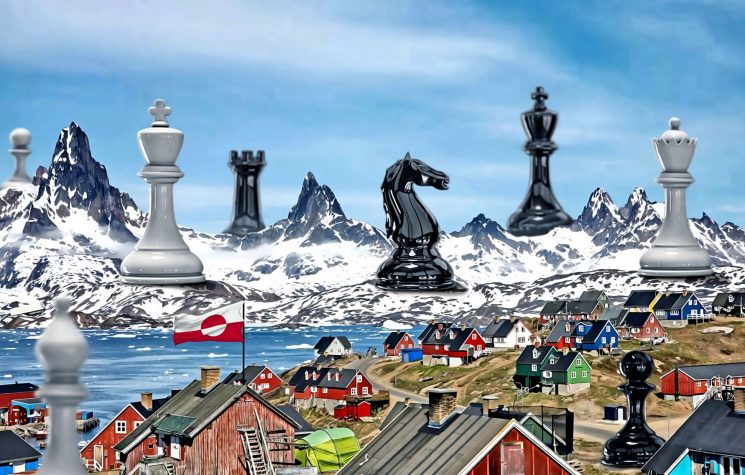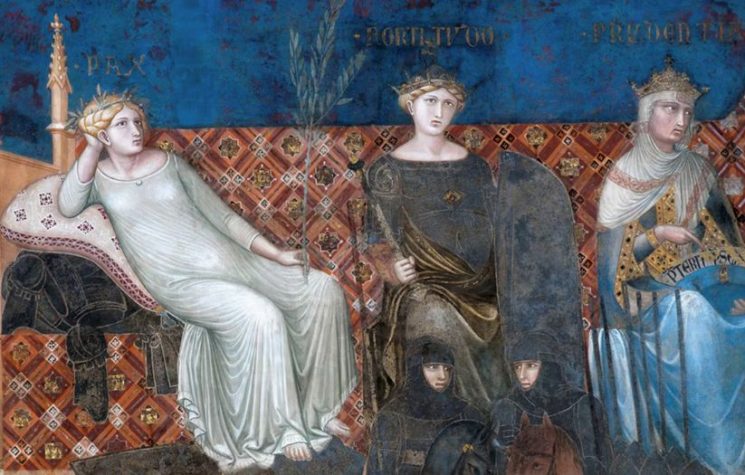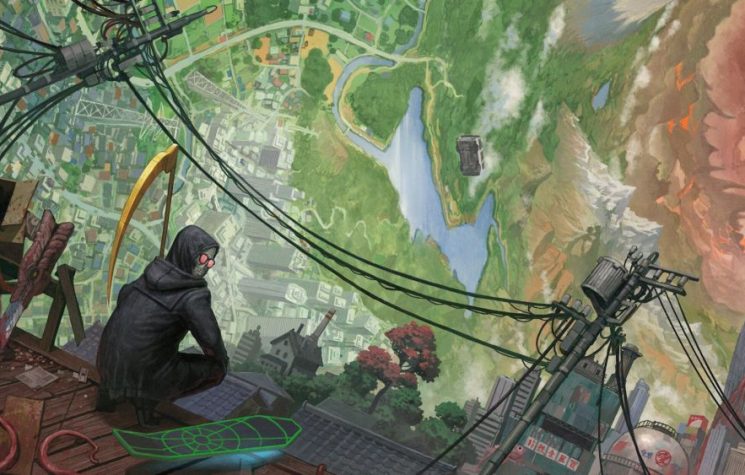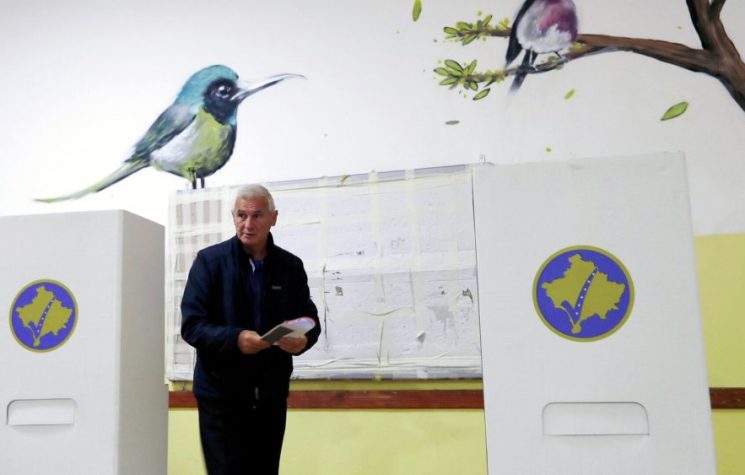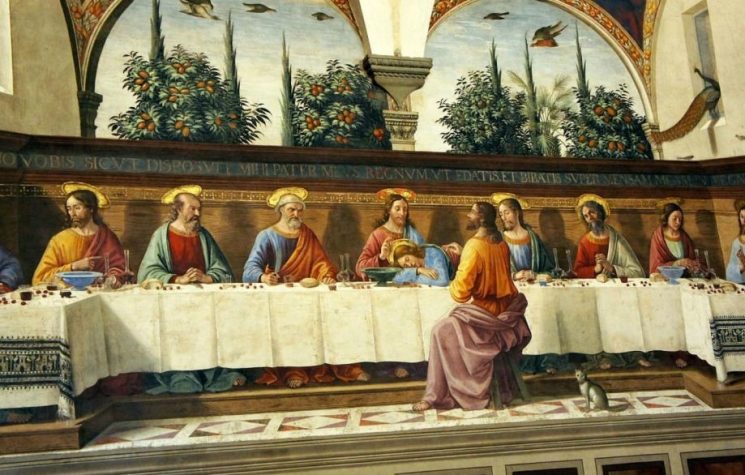The aim of children’s entertainment, it seems, should be to engender eternal hatred of all NATO’s enemies and Masha and Mishka must be no exception to that.
Once upon a time, in a country far, far away, there lived in a big, big forest a little girl called Masha, who loved to act the maggot all day long. Her best friend was Mishka, a big brown bear who lived in a cave in the forest. Masha had a cousin called Dasha, who played with them and the penguin who lived with Mishka and Mishka’s cousin, a cute panda bear from far away China. Rosie the pig, the two wolves who lived in the abandoned ambulance and many other ducks, squirrels, hares and tigers also liked to join in the fun.
It was such a very happy forest with such very happy little girls and boys who played with these happy animals, that all the boys and girls of that country far, far away liked to hear all about their funny adventures. Recipe for Disaster, one of their cutest adventures, has been watched millions of times on youtube and some 4.5 billion times in Masha’s native language, thus making it youtube’s tenth most viewed video of all time and the most viewed video on youtube that is not a music video.
But there is a problem. As Masha’s native language is Russian, Germany’s Die Welt, taking their editorial cue from NATO’s far-right British media, has instructed Germany’s unthinking masses these wholesome and educational cartoons, which depict the adventures of this mischievous and fun-loving little Russian girl with her slightly grumpy friend the Bear and other woodland creatures, is nothing but vile Putinist propaganda aimed at imparting to Germanic children the appalling lesson that Russians might be nice people, who like to read their children reassuring bedtime stories as they tuck them in for the night.
The aim of children’s entertainment, it seems, should be to engender eternal hatred of all NATO’s enemies and Masha and Mishka must be no exception to that. And nor should Russian parents, who should forsake these delightful tales for stories of Fritz the Cat or Easter Bunnies bossing senile American presidents about. Russian children, it seems, should go to sleep with Russophobic tropes of self-hatred ringing in their little ears rather than Masha’s cuddly teddy bears to see them off into their gentlest dreams.
In our foundation year at Dublin’s Trinity College, we were assailed by propaganda lectures in politics by MI5 agent Basil Chubb, a friend of fellow MI5 informant George Orwell, who examined us on pseudo-academic articles declaring Russians were authoritarian because, when babies, they wore tight fitting winter under garments, to guard against frost bite. Though that quirky MI5 propaganda has stuck with me ever since, these attacks on a fictional Russian three-year old and her jungle buddies help put it all in perspective.
When I lived in Japan, students told me how much they enjoyed JK Rowling’s Harry Potter; a colleague, who bought the books for her children, assured me Rowling was just a modern-day Enid Blyton, that very successful English children’s writer, whose books have sold more than 600 million copies. Blyton, alas, has her critics, as of course does Rowling, for believing women are adult females, a simple, succinct and scientifically accurate summary if ever there was one.
But there’s the rub. NATO’s gatekeepers cannot accept that Masha and Mishka are but creations of a Russian genius, who drew on Russia’s vast well of folklore, and nothing more. Just as NATO has to bully Russia’s Paralympians and talented Russian teenagers like figure skater Kamila Valieva, so also do these Lolita Express commuters have to convince the world that there is something sinister in Russian parents being Russian parents.
Mishka, Masha, Rowling and Blyton are not my cup of tea. Because they are the creations of talented artists aimed to amuse children, not to amuse me, they are written in a certain style very few writers can master. Though Mishka and Masha are not, in short, the Brothers Karamazov they too, like Dostoevsky’s creations, try to elevate our common human soul to worthier planes.
POTUS John Fitzgerald Kennedy demurs. In a speech given at Amherst College, Massachusetts on October 26, 1963, which was quoted in the following day’s The New York Times, he declared that “In free society art is not a weapon…. Artists are not engineers of the soul.” Sorry Jack. All the evidence affirms that NATO weaponizes the most innocuous of words, those of Rowling and Mishka and Masha (who doesn’t talk) included. And even though Jack and particularly Bobby Kennedy were well read, artists do shape the collective soul; that is why Hunter Biden’s “art” hangs in American embassies.
Though Stalin’s uneasy relationships with composers and creative writers have been well documented, most particularly in the case of Dmitri Shostakovich and Boris Paternak, whom he famously dismissed as a “cloud-dweller”, the Soviets could at least recognise what art was and what it was not and who artists are and who they are not. This rendition of the Russian National Anthem includes many such engineers of the soul, as well as small arms’ engineer Mikhail Kalashnikov and Mishka, the universally loved mascot of the 1980 Moscow Olympics.
Mishka and Masha, the Russian diminutive for Maria, just as Katyusha, as in missile systems, is the diminutive for Ekaterina. Though the Katyusha song started its artistic life as a patriotic Soviet melody, following the universal theme of a faraway soldier fighting at the front to protect his beloved Ekaterina in his home village, it is here performed by a little girl in period costume for an audience, with an ensemble of Russian soldiers singing chorus.
Though those soldiers happily sing along, they are probably thinking of their own Katyushas and Mashas back in their home villages and, if they fight, they fight for the flesh and blood realities that are their loved ones, their own Katyushas and Mashas. Although soldiers may often be simple folk with simple tastes, America packages and weaponizes those tastes. That was the case in the Second World War and it remains the case today. Being devoid of any deep national culture themselves, they cannot conceive that Slavs, all Slavs, draw on much deeper communal wells that form the essence of their existence in war, as in peace. To the American mind (sic), Masha, Mishka and Katyusha must be products of Putin’s scheming mind, and not, for Putin and tens of millions like him, bitter sweet memories of grayer days, of little siblings lost in Leningrad’s siege and mothers and grandmothers left to soldier on, with nothing but Masha, Mishka, Katyusha and what might have been to sustain them and those who survived.
Masha, Mishka and Katyusha are pools reflecting into the Russian soul, just as are Raskolnikov, Fyodor Pavlovich Karamazov, Dmitri Fyodorovich Karamazov, Ivan Fyodorovich Karamazov, Alexei Fyodorovich Karamazov, Anna Arkadyevna Karenina, Count Alexei Kirillovich Vronsky, Nikolai Dmitrievich Levin, Princess Ekaterina “Kitty” Alexandrovna Shcherbatskaya, Count Pyotr “Pierre” Kirillovich Bezukhov, Prince Nikolai Andreich Bolkonsky, Prince Andrei Nikolayevich Bolkonsky, Count and Countess Rostov, the Kuragins, the Drubetskoys and Yuri Zhivago.
I hope that Russian children and children worldwide will continue to be enthralled by Masha and Mishka, that they will grow to read of Raskolnikov, the Karamazovs, Anna Karenina and listen to Katyusha, Tchaikovsky, Rimsky-Korsakov, Rachmaninoff, Prokofiev, Stravinsky and Shostakovich.
Most of all, I hope all God’s children can grow up to reminisce on golden childhood days sealed, at day’s end, with tales of Masha and Mishka, and their Chinese, Japanese, African and Arabic equivalents. Though it is little to ask, NATO, Die Welt and the Times want to deny even that lest children, nourished by their parents’ love, mature as they should.
Masha and Mishka are not the Russian stooges NATO’s barbarians wish them to be. Rather, they are the unblemished faces of childhood innocence NATO, the Times and Die Welt fear, just as Dracula does the morning sun. Instead of embracing and respecting Masha, Mishka and Katyusha for who and what they are, NATO have chosen the same unwinnable battle as King Canute did when he battled the oceans. I’m with Masha and Mishka on this one. How about you?

















